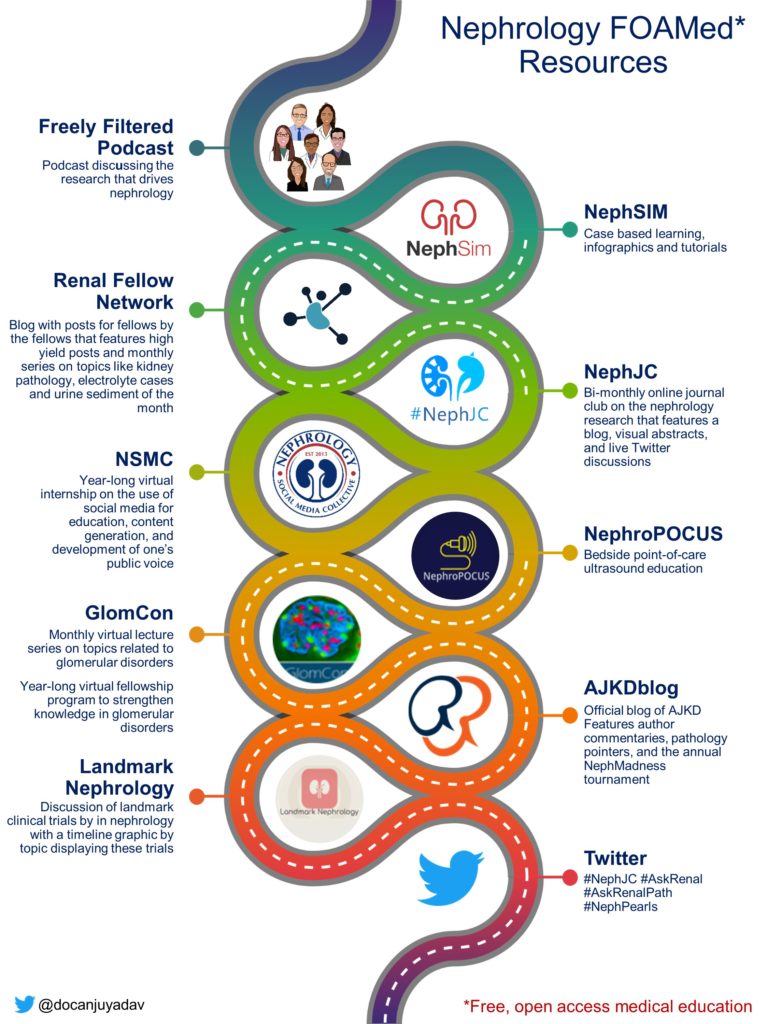Hey Neph Fellows,
You made it to Day 1 of Nephrology Fellowship! We’ve put together 10 tips to help as you embark on this exciting journey. Good luck and when in doubt, spin that urine.
Get excited. This is going to be amazing.
The RFN Team
1. Breathe! Remember that every time someone is paging you with a question, they are asking for help. Be the fellow you wish you got to page as a medical student. Expect others to extend you the same courtesy. Every call and consult is a teaching opportunity. And don’t forget, you’re a trained internist too!
2. Learn your electronic medical record (EMR). Spend some time with a senior fellow or attending to see what efficiency tricks they use. How do they see how vascular accesses have been documented? How do they make a list that shows them the creatinine, potassium, sodium, bicarbonate, blood pressure, and FK506 level all at once? How does the urine output magically appear in the note?
3. Talk to the primary teams and other specialists. Picking up the phone to establish a friendly work environment goes a long way toward making communication easier and more productive. You are now an ambassador for our field – make nephrology look and sound great!
4. Join professional nephrology societies and take advantage of free, open-access medical education resources (FOAMed) – many of these will deliver education directly to your inbox. Join professional societies. The National Kidney Foundation, Renal Physicians Association, and American Society of Nephrology offer free membership to fellows and are great resources for events, professional guidance, and board review materials such as NephSAP and KSAP.
Whatever your learning style or preference, one of the FOAMed tools below might be for you. The world of NephTwitter and online medical education offer a chance to see the bigger context of your field that you may not otherwise see as a trainee. Consider getting involved as a NSMC intern or just participate in online journal clubs, topic discussions, or forums. If you spend a lot of time learning about something neat, submit it as a blog post here! The sense of fellowship and connection you will gain is truly invaluable. Want to write up a case? Consider submitting it to one of these journals or as an abstract to a national meeting. Watch a FOAMed video from Dr. John Roberts.

5. Spin the urine. Get cozy in your urine microscopy room. In the beginning, take an attending with you to help you understand what you’re looking at. Find opportunities to take trainees to the urine microscopy room so they know that muddy brown casts are real, not just in their books.
6. Access is Key: Get to know your Interventional Radiology and Vascular Surgery Department. Literally. Go visit them. We promise you will be glad you did when it’s 3pm and you wish you had a friend to place a tunneled dialysis catheter.
7. Keep your lifelines accessible. Store attending physician, dialysis nurse, emergency room, and hospital operator phone numbers in your phone. Try making an album in your phone of quick reference guides for common problems. Save infographics and protocols you like. Here’s an example of an electrolyte repletion guide. Check out the NephSIM Image Gallery for infographics.
8. Identify Mentor (s!). These may be clinicians, researchers, division chiefs or new faculty. They may not even be in your division or institution. Don’t be shy to send an email, introduce yourself, schedule meetings, discuss your interests, and take notes when you meet. Writing down your goals has been shown to increase your chances of attaining your desired objective. Once you’ve identified a mentor, be honest with them and yourself. Discuss anticipated goals, expected authorship, etc explicitly.
9. Get in the habit of explicitly setting goals and obtaining feedback on a regular basis. This is the last stage of your training and you want to be sure you gain the absolute most you can.
10. Get a list of local dialysis unit phone numbers from your in-center dialysis nurse. Did that patient get a full run before they were sent to the ED? Do they frequently come in 12kg over their dry weight? Are they receiving any medications during dialysis that you should continue? Dialysis centers see their patients more often than most kids visit their parents and are an invaluable source of information.
For bonus points, make a map of your local dialysis centers. Keep it in your phone. When you talk about dialysis initiation with patients, it helps to be able to find places near their home.
11. Ok we lied, there’s one more. Don’t forget to spend some time with your friends, family, non-nephrology hobbies, and the things that make you you. This sounds cliche but it is crititcally important for your mental health, relationships, and longevity.
Have another tip? Share it with us in the comments.



Great resource.
Also get yourself a “well done book”. Store complimentary cards, letters, and written comments from patients and their families, and from other physicians and administration – you’ll get them.
It is a nice resource on a rainy day.